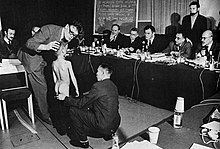
The Russell Tribunal, also known as the International War Crimes Tribunal, Russell–Sartre Tribunal, or Stockholm Tribunal, was a private people's tribunal organised in 1966 by Bertrand Russell, British philosopher and Nobel Prize winner, and hosted by French philosopher and writer Jean-Paul Sartre, along with Lelio Basso, Simone de Beauvoir, Vladimir Dedijer, Ralph Schoenman, Isaac Deutscher, Günther Anders and several others. The tribunal investigated and evaluated American foreign policy and military intervention in Vietnam.
Bertrand Russell justified the establishment of this body as follows:
If certain acts and violations of treaties are crimes, they are crimes whether the United States does them or whether Germany does them. We are not prepared to lay down a rule of criminal conduct against others which we would not be willing to have invoked against us.
— Justice Robert H. Jackson, Chief Prosecutor, Nuremberg War Crimes Trials[1]
The tribunal was constituted in November 1966, and was conducted in two sessions in 1967, in Stockholm, Sweden and Roskilde, Denmark. Bertrand Russell's book on the armed confrontations underway in Vietnam, War Crimes in Vietnam, was published in January 1967. His postscript called for establishing this investigative body.[2] The findings of the tribunal were largely ignored in the United States.
Further tribunals were also held on various other issues, including psychiatry, human rights, and the Israel-Palestine conflict and, most recently, on the disputed territory of Jammu and Kashmir.[3]
- ^ Watling, John (1970) Bertrand Russell. Oliver & Boyd. ISBN 978-0-0500-2215-3
- ^ B. Russell, War Crimes in Vietnam. Ed. Monthly Review, January 1967; ISBN 978-0-85345-058-0
- ^ "Voiceless no more: The Russell Tribunal on Kashmir". Archived from the original on 4 January 2022. Retrieved 4 January 2022.